Presentation of the HLC Dossier: “Crimes against Croats in Vojvodina”
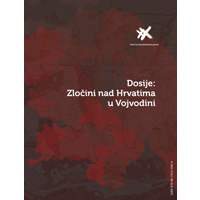
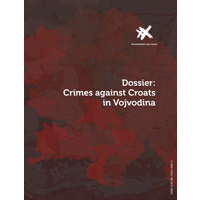 On Thursday, January 31, 2019, the Humanitarian Law Center (HLC) will present its eleventh dossier, entitled “Crimes against Croats in Vojvodina” (Dossier). The presentation will take place in the Great Hall of the Media Center in Belgrade (Terazije 3, II floor) at 12:00.
On Thursday, January 31, 2019, the Humanitarian Law Center (HLC) will present its eleventh dossier, entitled “Crimes against Croats in Vojvodina” (Dossier). The presentation will take place in the Great Hall of the Media Center in Belgrade (Terazije 3, II floor) at 12:00.
During the period 1991-1995, in the territory of the Autonomous Province of Vojvodina, there was a campaign of intimidation and pressure on Croatian civilians with the aim of forcing them to leave their homes, and Serbia as well. Vojislav Šešelj and his Serbian Radical Party were the main advocates and inspirers of this campaign. Violence against Croats in Vojvodina included attacks on their private property and religious buildings, as well as threats, physical attacks and murders, and resulted in the expulsion of several thousands of Croats from Vojvodina.
This intimidation campaign took place with the awareness and tacit approval of the political structures of the Republic of Serbia. The evidence presented in this Dossier shows that in some acts of violence against Croats, the persons from the State Security Department of the Ministry of Internal Affairs of the Republic of Serbia also took part.
Speakers:
- Jovana Kolarić
- Ivana Žanić
- Vesna Abjanović
Simultaneous interpretation into English will be provided







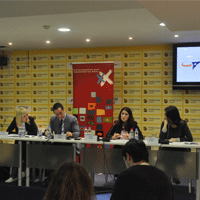




 On Thursday, 20 December 2018, the Humanitarian Law Center (HLC) will present the “Third Report on the Implementation of the National Strategy for the Prosecution of War Crimes” and the Analysis “Regional Judicial Cooperation in the Prosecution of War crimes: Analysis and Improvement Recommendations”. The presentation will take place at 11:00 in the Great Hall of the Media Centre (Terazije 3, 2nd Floor).
On Thursday, 20 December 2018, the Humanitarian Law Center (HLC) will present the “Third Report on the Implementation of the National Strategy for the Prosecution of War Crimes” and the Analysis “Regional Judicial Cooperation in the Prosecution of War crimes: Analysis and Improvement Recommendations”. The presentation will take place at 11:00 in the Great Hall of the Media Centre (Terazije 3, 2nd Floor).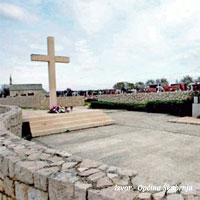
 On Sunday, November 18, 2018, we mark exactly 27 years since the commission of the crimes by members of the Yugoslav People’s Army (JNA) and Territorial Defence (TO) of Benkovac against Croatian civilians in the villages of Škabrnja and Nadin. Although the Humanitarian Law Center (HLC) filed criminal charges for these crimes with the Office of the War Crimes Prosecutor (OWCP) in November 2017, to date the HLC has no information as to whether the OWCP has taken any legal action that would lead to the trial of those responsible for this crime.
On Sunday, November 18, 2018, we mark exactly 27 years since the commission of the crimes by members of the Yugoslav People’s Army (JNA) and Territorial Defence (TO) of Benkovac against Croatian civilians in the villages of Škabrnja and Nadin. Although the Humanitarian Law Center (HLC) filed criminal charges for these crimes with the Office of the War Crimes Prosecutor (OWCP) in November 2017, to date the HLC has no information as to whether the OWCP has taken any legal action that would lead to the trial of those responsible for this crime. Today, exactly two years have passed since the Humanitarian Law Center (HLC) filed a
Today, exactly two years have passed since the Humanitarian Law Center (HLC) filed a 
 On October 16, 2018, the Humanitarian Law Center (HLC) filed a criminal complaint with the Office of the War Crimes Prosecutor (OWCP) of the Republic of Serbia against several unknown persons, for killing three members of the Matijević family in April 1992 in Kukujevci (Municipality of Šid, Serbia).
On October 16, 2018, the Humanitarian Law Center (HLC) filed a criminal complaint with the Office of the War Crimes Prosecutor (OWCP) of the Republic of Serbia against several unknown persons, for killing three members of the Matijević family in April 1992 in Kukujevci (Municipality of Šid, Serbia).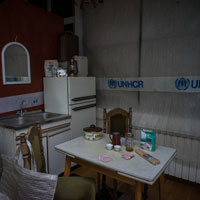
 From September 25 to October 6, 2018, the Humanitarian Law Center (HLC) and the History Museum of Bosnia and Herzegovina presented in Belgrade a part of the museum’s permanent exhibition, entitled “Besieged Sarajevo”. With photographs, documents, and hand-made items made by citizens of Sarajevo, the exhibition depicts life in the city that the Republika Srpska Army (RSA) kept under siege for 44 months. Visitors could see what life in a city without water, electricity and heating looked like, how schools operated, how children played, and how food was procured, along with other daily activities in the city that, despite everyday sniper attacks from the surrounding hills, sought to preserve the illusion of a normal life.
From September 25 to October 6, 2018, the Humanitarian Law Center (HLC) and the History Museum of Bosnia and Herzegovina presented in Belgrade a part of the museum’s permanent exhibition, entitled “Besieged Sarajevo”. With photographs, documents, and hand-made items made by citizens of Sarajevo, the exhibition depicts life in the city that the Republika Srpska Army (RSA) kept under siege for 44 months. Visitors could see what life in a city without water, electricity and heating looked like, how schools operated, how children played, and how food was procured, along with other daily activities in the city that, despite everyday sniper attacks from the surrounding hills, sought to preserve the illusion of a normal life.